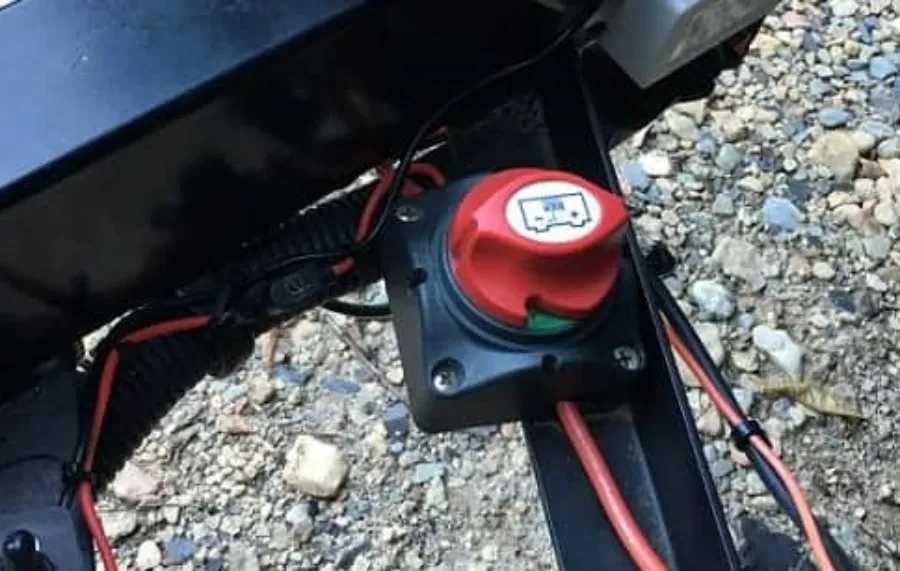The Most Common RV Battery Disconnect Switch Problems with Solutions

Last updated on August 12th, 2024 at 11:33 pm
The battery disconnect switch is an important feature in any travel trailer. With this feature, you only need to disconnect one cable and cut the electrical power to your travel trailer. This saves you a lot of trouble in the long run. However, previous users can attest to experiencing problems when they are plugged in to charge.
These issues typically arise from faulty connections, dead RV batteries, incorrect switch location, corrosion, overuse of the switch, or disconnection from the battery. Luckily, these issues can be easily solved. If your attempts to repair the situations fail, however, you can always contact an expert in the field to sort it out for you.
This post aims to help you if you are facing any of these issues with the RV battery disconnect switch.
RV Battery Disconnect Switch Problems and Solutions

The RV battery disconnect switch is designed to break the electrical connection between the RV battery and other electrical systems in the trailer when not in use. This is important as it helps to prevent the battery from powering unnecessary components such as the lights when parked. Moreover, it guarantees to always be full charge so when you need to use it, you need not worry about running out of power on the road.
However, there are several problems that have associated with this switch. They are as outlined below.
Dead RV Battery
If the issue is that you are dealing with a dead battery and the disconnect switch is off, there are several things you can check. It could be that the battery disconnect is not cutting off power from the battery to the RV. Thus, the draw of power from components such as the smoke detector will drain the battery until it dies.
To solve this, you need to check whether the switch fully turns to the off position and see if it resolves the issue. If not, the issue could be a bad switch.
Faulty Connections
It is important that all connection points to the battery are clean and corrosion-free. Moreover, all wires should be securely fastened to their respective terminals and none of them is broken off or loose. In case of anything, you can always contact a professional electrician regarding any electrical system issues.
Incorrect Switch Location
This is a common mistake—placing the switch at the front of the vehicle where it is likely to be turned off in transit. It also makes it easy for thieves to access and disable it. Therefore, ensure that you keep it hidden. You can also mount it inside a compartment door or hatch and use a long extension cord where necessary.
Disconnected From the Battery
If you notice that the disconnect switch is still connected to the battery but does not work, it can be attributed to a loose connection. if that is the case, you can try tightening it and then check to see if it works. However, if that fails or the problem continues to occur, inspect them more thoroughly and replace the old parts that are not working properly.
Moreover, it could be frayed insulation or broken wire that is causing a short circuit in the system. This is a dangerous scenario because you cannot tell how much damage has been done before you notice it. If none of the solutions work, it would be time to contact a professional before you attempt any more repairs.
Corrosion
If you regularly leave the RV battery disconnected, the switch could overload from the current. Corrosion is also likely to cause sticking together of the internal contacts and thus no proper connection is made when you turn off the RV power supply.
Overuse of the Battery Disconnect Switch
Another common cause for failure is overuse. These switches, by design, should be used occasionally—not every time you turn off the RV. If you tend to use it more than once a week, you can consider replacing it with a manual switch.
FAQs
Conclusion
The RV battery disconnect switch is generally a simple device. It comes in handy to protect your batteries from being unnecessarily drained. You are likely to encounter the aforementioned problems with this switch at some point. Thankfully, these issues have simple answers and can be resolved in no time.
You Can Also Read:
- Westinghouse Igen2500 Problems
- 3126 Cat Engine Problems
- Keystone RV Air Conditioner Problems
- Onan p4500i Generator Problems
- Kenworth T680 Cruise Control Problems
- Best 12V Portable Camping Fridge - August 13, 2024
- How to Insulate Slides on an RV - February 8, 2024
- How Much Water Does an RV Use Per Day? Understanding Your Daily Consumption - February 8, 2024






